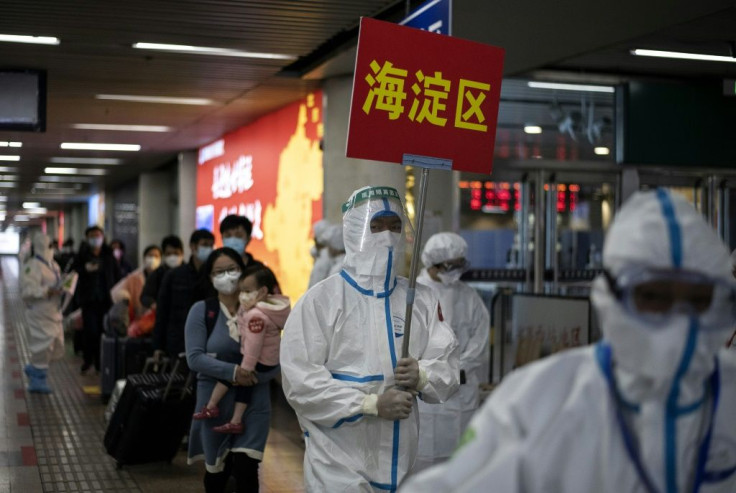Coronavirus Update: China Responds To Reports It Waited Six Days To Act On Outbreak In Wuhan

KEY POINTS
- Reports said Chinese officials in Beijing were told about the spread of coronavirus in Wuhan and the risk it posed to the rest of the country a week before warning the public
- China's Health Ministry pushed back, saying it has remained "transparent" with the World Health Organization about the outbreak
- One reason cited for the delay is China's strict control on the flow of information in and out of the government
Chinese officials pushed back on reports Thursday that the government was aware of the coronavirus outbreak in Wuhan, but waited nearly a week to warn the public about the highly contagious pathogen.
“In an open, transparent and responsible manner, China has kept the WHO [World Health Organization] and relevant countries and regions updated on the outbreak,” a spokesperson for China's Foreign Ministry told CNN. “Those who accuse China of being nontransparent are unjust and insulting to the great sacrifices made by the Chinese people.”
The Foreign Ministry’s comments were in response to a report from the Associated Press that said it had acquired documents and internal memos shared with top Chinese officials in Beijing. The documents reportedly showed “top Chinese officials secretly determined they likely were facing a pandemic” but waited to notify the public.
As this was going on, residents of Wuhan, the epicenter of the outbreak, continued on as normal while thousands were traveling to the city to celebrate the Lunar New Year.
“This is tremendous,” UCLA epidemiologist Zuo-Feng Zhang told the Associated Press. “If they took action six days earlier, there would have been much fewer patients and medical facilities would have been sufficient. We might have avoided the collapse of Wuhan’s medical system.”
Experts pointed to China’s rigid and strict control on the flow of information as a major reason for the delay. Doctors also reportedly were afraid to voice concerns after eight doctors were punished on national TV for “rumor-mongering” about COVID-19.
It wasn’t until the first cases popped up in Thailand on Jan. 13 that China took action in Wuhan.
Another memo showed Ma Xiaowei, the head of China’s National Health Commission, warned of the serious threat the outbreak posed during a teleconference with provincial officials. The teleconference reportedly was held on Jan. 14 to share instructions on how to handle the pandemic from President Xi Jinping, Premier Li Keqiang and Vice Premier Sun Chunlan.
The instructions were not included in the memo.
“The epidemic situation is still severe and complex, the most severe challenge since SARS in 2003, and is likely to develop into a major public health event,” Xiaowei said, according to the memo.
“With the coming of the Spring Festival, many people will be traveling, and the risk of transmission and spread is high. All localities must prepare for and respond to a pandemic.”
The report seemed to support President Donald Trump’s accusations that China’s slow response held back a global response to the virus’ spread. However, it has since become clear Trump ignored almost two months of warnings from the World Health Organization and staff members in the White House about the dangers of COVID-19 spreading.
Following China’s warnings about the virus on Jan. 22, the New York Times said the WHO began to hold briefings with world leaders warning them about the seriousness of the outbreak. Despite this, Trump has repeatedly attacked the WHO by saying it was too close to China. He ordered funds to the organization withheld Tuesday, an action that has been sharply criticized both inside the U.S. and abroad.
Trump’s previous comments on Twitter contradict his latest accusations, as well, as his repeated praise of China’s efforts to contain the virus in January.
Some within the organization have been critical of the response, saying more could have been done.
“The charitable way to look at this is that W.H.O. simply had no means to verify what was happening on the ground,” Larry Gostin, director of the W.H.O.’s Center on Global Health Law, told the New York Times. “The less charitable way to view it is that the W.H.O. didn’t do enough to independently verify what China was saying, and took China at face value.”
While other experts were critical of the W.H.O., they also gave the benefit of the doubt as it tried to toe the line with world governments as an arm of the United Nations.
“Clearly a decision was taken by Dr. Tedros and the organization to bite their tongues, and to coax China out of its shell, which was partially successful,” University of Ottawa public health and law professor Amir Attaran said.
“That in no way supports Trump’s accusation. The president is scapegoating, dishonestly.”
© Copyright IBTimes 2025. All rights reserved.





















